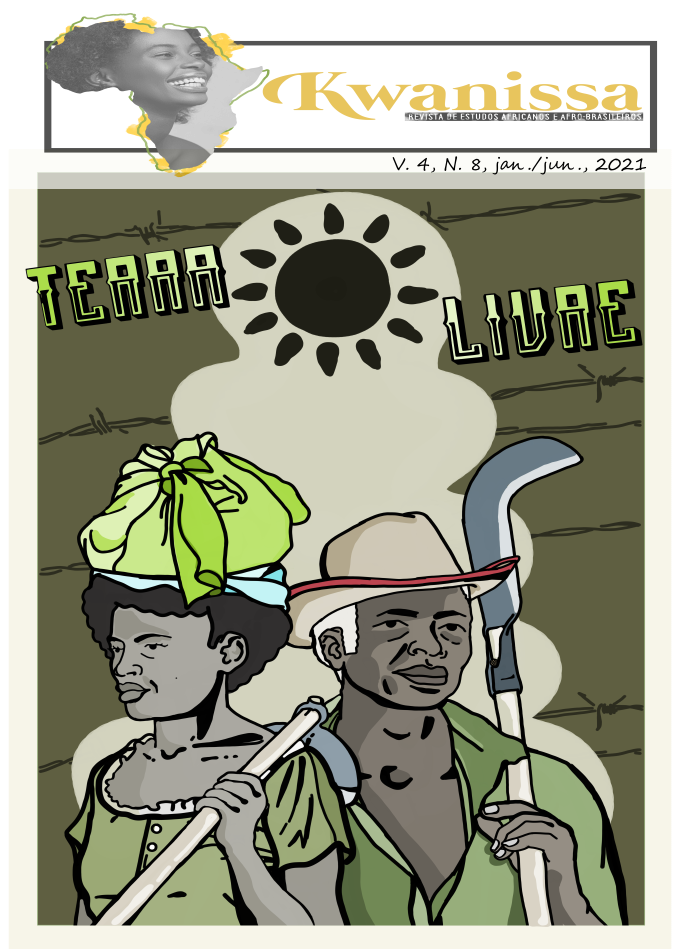MOVIMENTO NEGRO DE URUGUAIANA: PROTAGONISMO DE MULHERES NEGRAS EM REGIÃO DE FRONTEIRA”
Abstract
THE URUGUAIAN´S BLACK MOVEMENT:
protagonism of black women in border region
EL MOVIMIENTO NEGRO DE URUGUAIANA:
protagonismo de mujeres negras en región fronteriza
Resumo
As práticas discriminatórias vão além de bloquear a mobilidade, surtem um efeito de negação do corpo, no caso aqui estudado o corpo de mulheres negras na fronteira. Compartilhamos aqui as resistências, de mulheres negras na Fronteira Oeste Gaúcha e como elas rompem a herança das correntes territoriais deixadas pela escravidão, nas denominadas “charqueadas”. O protagonismo dessas mulheres, em uma região de agropecuária e transporte Internacional aduaneiro. Em tempos de pandemia mundial provocada pelo Covid-19 e de isolamento social, fizemos uso de entrevista na modalidade online (virtual) pelo google meets, whatsapp e questionário com perguntas gerais. Entrevistamos mulheres negras que são sementes da luta do Movimento Negro de Uruguaiana (MNU) /RS, e demais entidades sociais negras. As narrativas nos ajudaram a entender as relações: corpo, território, em uma região fronteiriça. Os resultados obtidos foram surpreendentes, na medida em que estas mulheres recorrem à sua ancestralidade e organizam conversas e outros eventos como modo de combate político e histórico. Nessa perspectiva, a resistência em Uruguaiana, embranquecida pelo racismo nas relações sociais, se dá por meio da mobilização sócio-política e histórica desse grupo afro gaúcho.
Palavras-chave: corpo, território, mulheres negras, fronteira, resistência
Abstract
The discriminatory practices go beyond blocking mobility, they have got an effect of denying the body, in the case studied here of the body of black women on the border. The resistance of black women in the Western Frontier Gaúcha and how they break the legacy of the territorial currents left by slavery, in the so-called “charqueadas”. The role of these women, in a region of agriculture and international customs transport. In times of global pandemic caused by Covid-19 and social isolation, we used an interview in the online (virtual) modality by google meets WhatsApp and a questionnaire with general questions. We interviewed black women who are seeds of the struggle of the Negro Movement of Uruguaiana (MNU) / RS. The narratives helped us to understand the relationships: body, territory, in a border region. The results obtained were surprising, as these women resort to their ancestry and organize conversations and other events as a means of political and historical combat. In this perspective, the resistance in Uruguaiana, whitened by racism in social relations, occurs through the socio-political and historical mobilization of this Afro-Gaucho group.
Keywords: body, territory, black women, border, resistance
Resumen
Además de bloquear la movilidad, las prácticas discriminatorias, tienen el efecto de negar el cuerpo, en el caso aquí estudiado del cuerpo de mujeres negras en la frontera. Compartimos aquí las resistencia de las mujeres negras en la Frontera Oeste Gaucha y cómo rompen las barreras territoriales abiertas por la esclavitud, en las regiones de “charqueadas”. El papel de estas mujeres, en una región de agricultura y transporte aduanero internacional. En tiempos de pandemia global provocada por Covid-19 y aislamiento social utilizamos una entrevista en la modalidad online / virtual por google meets en la que entrevistamos a mujeres negras que son semillas de la lucha del Movimiento Negro Uruguaiana (MNU)/RS.
Las narrativas nos ayudan a comprender las geografías expandidas de resistir en una región blanqueada por el racismo en las relaciones sociales.
Palavras claves: corpo, território, mujeres Negras, frontera, resisténcia
Downloads
Downloads
Published
How to Cite
Issue
Section
License
Direitos autorais Kwanissa: Revista de Estudos Africanos e Afro-Brasileiros
Este obra está licenciado com uma Licença Creative Commons Atribuição-NãoComercial-SemDerivações 4.0 Internacional.











